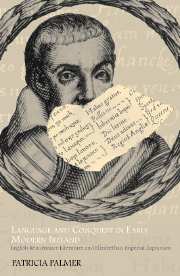 Language and Conquest in Early Modern Ireland
Language and Conquest in Early Modern Ireland Book contents
- Frontmatter
- Contents
- Acknowledgements
- List of abbreviations
- Introduction
- Chapter 1 Conquest, colonial ideologies and the consequences for language
- Chapter 2 ‘A bad dream with no sound’: the representation of Irish in the texts of the Elizabethan conquest
- Chapter 3 ‘Wilde Speech’: Elizabethan evaluations of Irish
- Chapter 4 ‘Translating this kingdom of the new’: English linguistic nationalism and Anglicisation policy in Ireland
- Chapter 5 New world, new incomprehension: patterns of change and continuity in the English encounter with native languages from Munster to Manoa
- Chapter 6 The clamorous silence
- Conclusion
- Glossary
- Notes
- Bibliography
- Index
Chapter 4 - ‘Translating this kingdom of the new’: English linguistic nationalism and Anglicisation policy in Ireland
Published online by Cambridge University Press: 22 September 2009
- Frontmatter
- Contents
- Acknowledgements
- List of abbreviations
- Introduction
- Chapter 1 Conquest, colonial ideologies and the consequences for language
- Chapter 2 ‘A bad dream with no sound’: the representation of Irish in the texts of the Elizabethan conquest
- Chapter 3 ‘Wilde Speech’: Elizabethan evaluations of Irish
- Chapter 4 ‘Translating this kingdom of the new’: English linguistic nationalism and Anglicisation policy in Ireland
- Chapter 5 New world, new incomprehension: patterns of change and continuity in the English encounter with native languages from Munster to Manoa
- Chapter 6 The clamorous silence
- Conclusion
- Glossary
- Notes
- Bibliography
- Index
Summary
What worthier thyng can there bee, then with a woorde to winne Cities, and whole countries.
Thomas Wilson, The Arte of Rhetorique, fo. a.ii.rTo judge a language in a time of conquest was an act of criticism with practical implications. Newcomers' impressions of Irish shaped their language policies. With cultural difference mapping political difference so precisely, a language regarded as housing dissent and querulous diversity could not escape the attentions of those advancing Tudor centralisation and uniformity. Irish was popish; it was the agent of an invasive otherness which had derailed the cultural integrity of the original colony; it hung as a threat over the identity of the new settlers. With the boundaries between medium and message blurred, silencing dissent shaded into silencing Irish. In the affairs of language, however, ‘silence’ is a purely notional state: in reality, not to speak Irish meant to speak English.
For English language policy was far from being purely defensive. Just as the newcomers' desire to gag the carping vernacular was grounded in negative evaluations of Irish, so their inclination to impose their own language rested on a chauvinistic estimation of English. This double movement, which combined an indolent deprecation of Irish with a burgeoning confidence in English, brings us close to the nub of Elizabethan cultural nationalism and the linguistic imperialism which flowed from it.
- Type
- Chapter
- Information
- Language and Conquest in Early Modern IrelandEnglish Renaissance Literature and Elizabethan Imperial Expansion, pp. 108 - 147Publisher: Cambridge University PressPrint publication year: 2001


